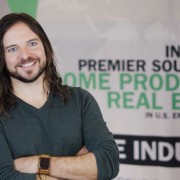8 Simple Steps To Riches In Real Estate Or In Any Other Field, For That Matter
By Reggie Brooks
Before I got involved with real estate I tried various other potential money-making ventures. I created a company called Advanced Video Productions, and spent the first 4 weeks designing the all important ‘logo’. I might have thought that my income was totally dependent on a well designed, slick logo. I hadn’t learned anything about time management yet.
I created another company that sold satellite systems. This was way back when satellite dishes were huge. They could have been mistaken for UFO’s. My success? I sold 1 satellite system, period. And that one system was sold to a friend. I hadn’t learned anything about marketing.
Another time, I got involved with a Multi Level Marketing group and ended up with a garage full of water filters. Well, it really seemed like a good idea at the time…..
Through the many successes and failures that I’ve either experienced over the years or witnessed others experience, I’ve identified 8 steps you can take that can put you on the fast track to wealth. These are simple, powerful steps that really work!!
The 3 Cornerstones Of Success
I’ve taken a lot of seminars and classes over the years, and I’ve learned that personal and financial growth requires an investment. You must be willing to invest your money and your time. Then you must make a commitment to discipline yourself. What good is having a superior knowledge of creative real estate if you don’t discipline yourself to use it? Many successful real estate investors have invested many thousands of dollars in their creative real estate education. Their libraries are bulging with books, tapes, CD’s, DVD’s, and any other form of media necessary to put money-making techniques into their heads. They understand the power of “The 3 Cornerstones Of Success”.

The 3 Cornerstones Of Success are like a 3 legged stool. As long as there are 3 legs, the stool will support your weight. However, if you loose just 1 of those 3 legs, you’ll crash to the floor. This is a perfect parallel to the 3 Cornerstones Of Success.
- The 1st Cornerstone Of Success is continued education. As successful investors, we make our money buying distressed property from motivated owners. In order to do that, we must learn how to creatively solve the problems that owners have with their properties. None of us were born with this creative knowledge. We have to invest our money and our time into our education, and we have to learn the smart, money-making principles and techniques. Then, we use these smart, money-making principles and techniques as tools to creatively structure win-win deals. This is why we continue to read books, listen to tapes, and take classes. This brings us to the 2nd Cornerstone Of Success.
- The 2nd Cornerstone Of Success is discipline. You must discipline yourself to use the smart, money-making principles and techniques that you’ve learned. This doesn’t necessarily mean that you have to spend 15 hours each day to work your business. It could mean that you simply discipline yourself to write that offer, or send that letter out, or talk to that owner or neighbor, or anything else that you been procrastinating about. So much of the time we’re so close to success, but we give up just before we achieve it. Most of the time we give up because it is to scary or to painful to proceed on. Anticipating an owner who says no instead of yes can be both scary and painful. Dig down as deep as you need to and find that spark of passion that you can use to generate the discipline that you need. Use it like a magic carpet to fly above the pitfalls to success.
- The 3rd cornerstone is productive action on a daily basis. You must continue to learn, you must discipline yourself to use what you’ve learned, and now you must put it to work on a daily basis. It may be that the productive action of the day may only take 15 or 20 minutes. Success comes to the person who has made him/herself worthy of the success that they seek. And you make yourself worthy by following the 3 Cornerstones Of Success. Then, you’re prepared whenever opportunity comes along.
People sometimes ask me, “Come on, Reggie, tell me”. “What’s the secret to being successful in real estate”? There is no one individual ‘secret’ that will make you an instant millionaire in real estate. It’s more of a matter of doing a whole lot of little things correctly that empowers us to create a tremendous wealth. Doing smart things systematically toward your goal every day will breathe life into the 3 Cornerstones Of Success. There is nothing on this earth that can stop you if you simply follow the 3 Cornerstones Of Success. Here are a few other ideas that can help you to achieve your own level of success.

- Don’t Take Your Financial Advice From Broke People
When I first got involved in real estate, I let everyone know that I was launching into a new career. I told them that I was studying courses on how to perform creative real estate deals that would make me rich. I told them I was learning about no money down deals, how to get owner financing, how to rehab to increase profits, and so much more. I was so excited about my new real estate career that I had real trouble shutting up about it. As a matter of fact, I think that I got a little cocky. I’d tell anyone who would listen to me about the wealth that I was going to build in real estate.
I finally realized that I was sharing my excitement with the wrong people. I was sharing my dreams with people who had no respect for them. They would find ways to tell me that my dreams would never work. “There’s no such thing as a win-win deal”. “When someone wins, someone else has to loose.” They also said things like, “You can’t do no money down deals because there’s got to be some money in the deal someplace”. They never stopped to think that the money doesn’t have to come from you. It can come from the seller, the lender, the realtor, from private sources, or a great number of other places. It doesn’t have to come from your pocket.
This is when I realized just how important it is to share your ideas with the right people, and not the wrong people. Share your ideas with other investors or students who are of like mind – either doing deals and making money or learning and growing in creative real estate education. If you share your dreams with people who are not educated or not experienced in creative real estate techniques, you leave yourself wide open for opinions. When you get opinions from people that you respect, you have a tendency to believe them. This can be especially hazardous for new investors.

Always ask yourself the question, “By what authority does this person give me this advice. Has he/she been trained in this field? Has he/she worked in this field and made money?” If the answers are no, don’t listen to him/her. No matter how much you love or respect the person, you have to protect your financial future from well meaning people who are not qualified to give you financial guidance.
If you have a new born baby, you wouldn’t dare even think about exposing that baby to the harsh elements that could make your baby sick. You wouldn’t leave your new born baby outside in the rain or the snow. You wouldn’t leave your baby in the heat of the sun, or with unsavory characters as baby sitters. Treat your new real estate business just as you would your new born baby. Expose your baby to the people who can help it grow big and strong, but keep it away from those who will do it harm. And the difficult part is that for the most part, our uninformed friends don’t mean any harm. But if you let their unfounded opinions influence you, it can be fatal to your business.
If you will continue to learn the right things – the things that create win-win situations between you and the owner – the things that make you money, now you’re ready for the next lesson.
- Don’t Get Greedy
My friend and mentor, Dr. Albert Lowry tells his students that it’s OK to be a bit of a pig (I call it good negotiating). It’s OK to structure a deal where you make a lot of money. But don’t be a hog. You can blow a good deal by trying to hog all the profits. Don’t forget about the seller’s needs. Dr. Lowry says, “Pigs get rich, but hogs get slaughtered”. Makes sense, doesn’t it? Keep this phrase in mind. We’re going to talk about a principle that was so important in changing my life. As we discuss this principle, keep in mind that you can get rich faster by doing a lot of $20K to $30K deals than holding out for that big $100,000 deal. So, without further ado, I present to you “The Win Principle”. Caution: This principle works best when used with The 3 Cornerstones Of Success, which we talked about earlier. Here’s how it works:

The “WIN” Principle stands for “What’s Important Now”. Once you’ve educated yourself in creatively investing in real estate, you’ll know what you should be doing at any given time. Whether it’s using what you’ve already learned, or, if you’re a little short on knowledge, maybe taking in a seminar, workshop, bootcamp, or listening to books and tapes. It may be that you need to take a break, or the rest of the day off, or even a vacation. Whatever it may be – you know deep inside exactly what you should be doing at any particular time.
If you will discipline yourself to do What’s Important Now, you WILL accomplish your financial goals. What do you want? Do you want to be rich?? You can be rich!! If you will diligently exercise the 2 principles that I’ve outlined above, you will accomplish your financial goals!!! Does it sound easy? It does to me. I think it’s a simple thing to do, but it’s certainly not an easy thing to do.
- Failing To Screen Your Sellers
As investors, we make our money when we buy property from motivated sellers. I had to find that out the hard way. Very early in my career I found an little old lady that lived in a huge old house in Hollywood, California. Her name was Alice Jordan and she was part of a big mailing campaign that I was working at the time. When she responded to one of my letters, it felt like my heart was going to jump out of my chest an on to the floor!! My palms were sweaty, and my voice trembled. She said that she wanted to sell her house!! We immediately made an appointment to meet at her house the very next day.

It was sheer agony having to wait until the next day to meet with the lady in the big house. The thoughts running through my head were non-stop! Will she contact someone else? Will someone else contact her? Maybe a family member. What if she changes her mind? Am I really ready for this? This is a huge step! What if it doesn’t work? What if I fail? I don’t want to loose any money. Does any of this sound familiar to you? I think we all suffer with Uncontrollable Thought Syndrome. There’s nothing like doing a good deal and making yourself $20,000 to $40,000 to make all those negative thoughts disappear. You might still have those uncontrollable thoughts running through your head, but they’ll be a little different. Let’s see, I wonder if we should go to the Bahamas, or if we should go to Hawaii? Should I go for the Mercedes, or should I go for the BMW?
Back to the little old lady. For three weeks, we went back and forth. Every time I thought we were close, she’d throw some garbage into our deal that would bring negotiations to a halt. Then I’d call her after a few days, we’d reach what I thought was an agreement, and we would resume. This would happen over and over. You’d think I’d have gotten a clue about this one, but I didn’t.
I happened to be talking with a friend who was a fellow investor, and I mentioned Ms. Jordan, the lady that I was dealing with, and how frustrated I’d become. He looked at me with a little sly smile on his face. He said, “You mean Alice Jordan”? I said yes.
Needless to say, I was stunned. The uncontrollable thoughts started again. I quickly took control by feebly asking, “Uh, how do you know Ms. Jordan”? His answer cut like a knife. “Everybody knows old Alice. She gets lonely and calls on someone’s newspaper ad or direct mail piece. That’s how she entertains herself. She never leaves the house.’
I was crushed. I was merely an old lady’s entertainment. Everyone else knew about Ms. Jordan. I didn’t. My friend even called her by her first name!! That’s when I learned how important it is not to waste time on sellers that are not motivated. By the time you make an offer based on your profit criteria and you get a counter offer back from the seller, you’ll know whether you have a motivated seller or not.
- Lack Of Focus

There are so many different ways to make money in real estate. You can buy, fix up and sell. You can buy and hold for cash flow. You can wholesale to other investors. Come to think of it, you can even make money without ever owning the real estate. You can buy mortgages, and you can lend money and charge hefty interest rates. And this is just to name a few. It’s easy to see how a new investor can jump from one strategy to another. A new investor is usually excited about the prospect of getting money worries out of the way, and as a result they’re usually more than just a little impatient. The expectations are high, but the patience is low.
Success in real estate investing is directly dependent on your ability to take action, analyze your results, make your adjustments and take action again. It’s a sweet little cycle that you use to get rich. A success cycle, if you will. The best way to capitalize on this cycle is to focus on a system that is simple and easy to work, like Creating Wealth With Abandoned Properties. As you begin to work your system of choice, make sure you continue to learn from your results while you fine tune and tweak your business. This is how you become a master of your investment system. This is how you get RICH!!
You must stay focused on your goals. I read a book that my wife gave me when we first got together, called the Peak To Peak Principle. This was another one of those life changing experiences. I say experience because that’s what it was. It wasn’t just ‘reading a book’. It was the experience of learning a principle that could help make me rich.
Here’s how the Peak To Peak Principle works. Visualize yourself as a mountain climber doing what you do – climbing a mountain. If your goal is to reach the top of this mountain, then you’ll do well to keep your focus on your goal – the peak of this mountain. However, if your goal is to conquer other peaks then, before you reach this peak, you must shift your focus to the next peak. If you don’t shift your focus, you allow the first peak that you reach to become a plateau. It will take a lot of energy to get your momentum moving in the right direction again.
When you relate this principle to your real estate business, your plateau becomes a comfy little haven where you’ll find yourself sitting and relaxing. You might eat a sandwich, read a book, or listen to the radio. You might be so comfortable that you decide to spend the night, or the week, or the month, or the rest of your life.
Since you have your momentum going in the right direction, go with the flow. If you apply the Peak To Peak Principle to your real estate business, you can get to your goals a lot faster.

I THINK WE’VE JUST FOUND THE SECRET TO GETTING RICH!! It’s a matter of learning these and other ‘wealth-building’ principles and using discipline to operate my real estate business under those principles. For the first time, I can see the how of getting rich!
Having the scientific type mind that I have, that just made this revelation even more powerful. I can actually see in my mind’s eye exactly how I’m going to get rich!! I floated around on cloud 9 for a long time after that. As a matter of fact, I’ve never come down, and I never will. It’s almost like having a ‘secret weapon’ that most other investor don’t know much about. Learning and using the wealth-building principles can give you the edge over your competitors.
- Managing Your Fears
Every human being on the face of the planet has experienced fear in some form or another. I’d even be willing to bet you that every animal, insect, rodent, and every winged creature as well, has experienced fear. Fear definitely has a useful place in our lives. It’s purpose is as a early warning system. To alert us about possible dangers so that we can modify our path and create a solution to eliminate the danger. Fear was never meant to scare us into non-action.

Here’s an interesting idea. I believe that there is a purpose for every living creature on earth. Beavers build dams, humans solve problems. If you take a careful look around, you’ll see a whole lot of stuff that was created by the human species. If you look deeper, you’ll find that the purpose of each one of these inventions was to solve a problem.
It has been said that we learn better by doing, rather than by reading. In other words, at some point, you’re going to have to get out there and get your feet wet – you’re going to have to get started. I know, I know… It’s scary. Whenever you launch into something so big and significant that it can change your life, you’re going to get a little scared. Here’s a good way to handle your fears:
This solution to handling your fears is so simple that even I was able to master it. First of all, arm yourself with an abundance of knowledge about the situation. Be careful not to over-analyze the situation. You only need enough facts to make an intelligent decision. If you have a fear of writing your first offer, you may have to pick up a book, or take a seminar. You might have to make a bunch of copies and practice writing offers. Do what ever you have to do in order to arm yourself with the knowledge that you need. Then, keeping the WIN principle in mind, you simply take action. Isn’t that simple? It really is. The one antidote for fear is action. Intelligent, systematic action will not only make fear disappear, it can also make you rich.
Sometimes we have a certain type of fear that robs us of an important part of our growth. We’re afraid of making mistakes. Even though we’ve only been involved in real estate for 5 minutes, we have this crazy notion that we shouldn’t make mistakes. After all, we did take that 1 ½ hour seminar last year, we should be rich by now. If you have a problem admitting and accepting mistakes, you’re missing out on one of the greatest tools that you could have in the creation of wealth.

I was in my early 20’s when a 17 year old kid taught me something that will be with me for the rest of my life. He taught me that mistakes are our friends. He said that every mistake that we make has within it a lesson for us to learn. Some people are so busy trying not to make mistakes that they totally miss the lessons in the mistakes that they do make. By learning these lessons, then making the correct adjustment in our paths to success we can get to our goals at a very fast rate of speed.
What if you were able to look into the future. You might see that, in order for you to become a millionaire, it will take you making 175 mistakes, learning the lessons in each of those mistakes, applying those lessons to your business, and moving on to the next mistake. You might find yourself jumping out of bed and hurrying to meet the day! You can’t wait to make the next series of mistakes, because you know that at the end of your mistake making, lesson learning day, you’ll be closer to your goals! If you only made 5 mistakes yesterday, you’re going to kick it up today. You’ll make 10 mistakes today!! And, by the time you learn your lessons and apply the changes, you’ll be surprised at how quickly you can be very far along in reaching your goals.

You’re A Winner – Read On, And I’ll Prove It To You!
Always remember the winner that you are! You came into this world to create. So, create!! You have an ability within you to create whatever solution you need to overcome whatever problem that you think is standing in your way. If you will follow the principles that I’ve outlined in this article, you can do much to accomplish every one of your financial goals.
You are a winner. Remember? Three and a half million sperm chasing one egg. You won! You’re here! That’s evidence of the winner in you. Peace and prosperity to you and your family.

Reggie Brooks, is an international speaker, author and educator, dedicated to inspiring others to achieve personal success through real estate investment. He is also the #1 Vacant, Abandoned & Distressed Property Specialist in North America.
Having risen above a life of poverty, he has achieved what many people consider to be impossible. He went from making $36,000 per year at the local telephone company, to making over $40,000 per month in his real estate business. Today, Reggie delivers his personal philosophies for success at major business venues and expositions throughout the United States. Reggie attributes his success to faith, dedication to success, and to the invaluable coaches he has had along the way.













































